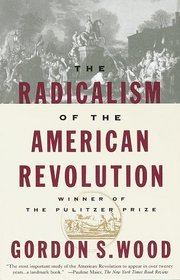Procrustes Stretched
Dante's Manifesto

The Radicalism of the American Revolution - Wikipedia
Seriously informative discussions here and elsewhere of 'republicanism' and 'liberalism' almost always lack any true historical context. The understandings and meanings of ideological and philosophical terms and arguments get lost over time.
I'm gonna try something here:
"Wood clarified the vaunted and maligned "End of Classical Politics" in a new preface to his 1969 study. First, he reminded readers, "it is important to remember that the boxlike categories of 'republicanism' and 'liberalism' are essentially the inventions of us historians.""
Synopsis
In The Radicalism of the American Revolution, Wood argued that in the "classical republican tradition our modern distinction between positive and negative liberties was not yet clearly perceived, and the two forms of liberty were still often seen as one." Wood premised this argument with the notion that "public or political liberty—or what we now call positive liberty—meant participation in government. And this political liberty in turn provided the means by which the personal liberty and private rights of the individual—what we today call negative liberty—were protected."[5] If "disinterestedness" in government "was based on liberty and independence, then it followed that only autonomous individuals free from any ties of interest and paid by no master were qualified to be citizens." Thomas Jefferson hoped that yeomen farmers who depended on their own " 'soil and industry' " would not be entirely dependent on "the casualties and caprice of customers." But for many "republican idealists" the "disinterested leadership could only be located among the landed gentry whose income [derived] from the rents of tenants."[6] Merchants attempted to be included in this leadership, aiming for "wealth and leisure sufficient to avoid any day-to-day involvement in their businesses."[7] This distance limited their social interactions, resulting in a conception of the world as small, affective, and almost filial. Banal statements and quotidian events became emotive, which was why they frequently interpreted a series of statements or events as a conspiracy.